The great Indian middle class seems unmindful that government regulation of fees of private independent schools — the sole bright spot of a crumbling education system — could be the first step towards levelling them down to the pathetic condition of government schools defined by ramshackle buildings, multi-grade classrooms, unusable toilets, and abysmal learning outcomes - Dilip Thakore
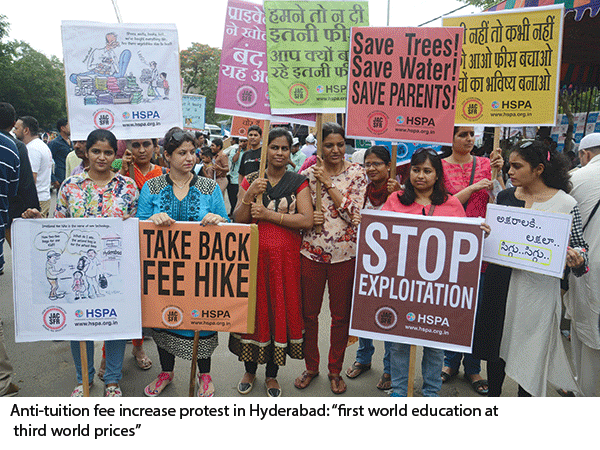 A virulent fever with symptoms of irrational behaviour and myopia seems to be spreading through India’s 300 million-strong middle class. Across the country, middle class households who have opted to enroll their children in private unaided (i.e. financially independent) K-12 schools — and wouldn’t dream of enrolling their precious offspring in the country’s 1.5 million non-performing government schools — are clamouring for government ‘regulation’ of tuition fees levied by India’s estimated 320,000 recognised private schools. Evidently their collective judgement is impaired by this fever because they seem unmindful that government intervention and diminution of the autonomy of private schools — the sole bright spot of a dysfunctional education system — could be the first step towards levelling them down to the pathetic condition of government primary-secondaries defined by crumbling buildings, multi-grade classrooms, unusable toilets, mass teacher absenteeism and abysmal learning outcomes.
A virulent fever with symptoms of irrational behaviour and myopia seems to be spreading through India’s 300 million-strong middle class. Across the country, middle class households who have opted to enroll their children in private unaided (i.e. financially independent) K-12 schools — and wouldn’t dream of enrolling their precious offspring in the country’s 1.5 million non-performing government schools — are clamouring for government ‘regulation’ of tuition fees levied by India’s estimated 320,000 recognised private schools. Evidently their collective judgement is impaired by this fever because they seem unmindful that government intervention and diminution of the autonomy of private schools — the sole bright spot of a dysfunctional education system — could be the first step towards levelling them down to the pathetic condition of government primary-secondaries defined by crumbling buildings, multi-grade classrooms, unusable toilets, mass teacher absenteeism and abysmal learning outcomes. 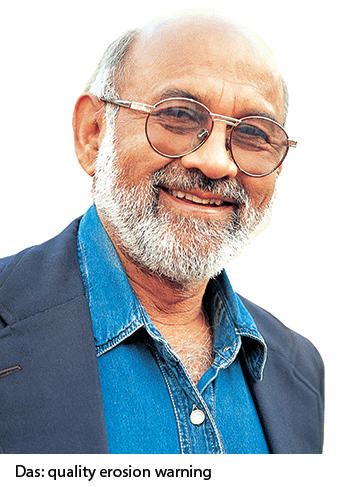
“This is a very disturbing development. Parents should be aware that promoters invest huge sums of money to establish globally comparable schools and therefore they are entitled to reasonable returns on their investment. If tuition fees are controlled by governments which apply uniform ceilings on fees, education quality will suffer, with supplementary co-curricular and sports education the first casualty. Government interference with the tuition fees of private schools will gradually lead to incremental official interference in other administrative matters. There’s a real danger of India’s private schools suffering the same fate as India’s universities ruined by government over-regulation,” warns Shomie Das, a graduate of Presidency College, Kolkata and Cambridge University (UK) who began his academic career as a physics teacher in the Gordonstoun School (UK), returned to India to teach at the Doon School, Dehradun and served long terms as principal of the top-ranked Lawrence School, Sanawar and Mayo College, Ajmer.
However, it’s unsurprising that calls for government intervention to control of tuition fees of private, independent schools are being made by the country’s middle class, despite it enjoying unprecedented prosperity. Since the nation attained freedom from foreign rule seven decades ago, the bourgeois middle class has cornered all the limited gains of unimpressive development. Completely ignoring the five millennia tradition of private enterprise and commerce of the subcontinent, India’s post-independence establishment led by its Harrow and Cambridge-educated first prime minister Jawaharlal Nehru established a leviathan socialist state which sucked up the meagre savings of rural and nascent urban India to promote massive Soviet-style capital-intensive public sector enterprises (PSEs). Inevitably, the country’s 361 Central government PSEs plus an unknown number of state government PSEs, (mis)managed by business illiterate clerks and bureaucrats, never managed to generate the promised surpluses that would be invested in education and health, leaving the majority of the population mired in 19th century poverty and backwardness.
But the urban middle class was relatively well-provided, particularly the bureaucracy, defence services and PSE employees whether they made a profit or not. Even though wages and salaries were low by global standards, the middle class was kept in good humour by way of heavily subsidised food, water, electricity, higher education etc. According to P. Chidambaram who served the scam-tainted Congress-led UPA I and II governments (2004-14) at the Centre as finance minister (with no particular distinction), total government “non-merit subsidies” to India’s pampered middle class absorb the equivalent of 14 percent of GDP, i.e, almost Rs.2 lakh crore per year. Moreover, the Central government’s ‘revenue foregone’, i.e taxbreaks to industry — another form of subsidy to the middle class — aggregated Rs.3.36 lakh crore in 2016-17.
The plain, unvarnished truth is that over the past seven decades of Nehruvian socialism, the Indian middle class has become ignorant of free market economics and addicted to subsidies. Hence the growing clamour for government ‘regulation’ i.e, control of tuition fees of private, financially independent schools which in effect is a demand for subsidy of K-12 education from private school promoters and managements. Unfortunately, in the early 1970s after Nehru’s daughter and prime minister Indira Gandhi superseded several judges of the Supreme Court and packed the court with “committed” (socialist) judges, the apex court passed several ex cathedra judgements prohibiting “commercialisation of education”, signalling a green light to government interference in the administration of private professional education institutions (medicine, engineering etc), forcing them to allocate quotas for state government-nominated largely middle class students at concessional tuition fees.
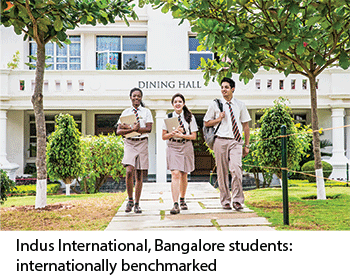 Consequently even after the Indian economy was substantially liberalised and deregulated in 1991, and a majority of a full-bench of the Supreme Court in an about-turn landmark verdict in T.M.A Pai Foundation vs. Union of India (2002) restored the rights of admission and fixation of reasonable tuition fees to private, professional college managements, liberal judges of the higher judiciary find they are bound by precedent judgements of the apex court and have not been able to grant full autonomy to private education institutions.
Consequently even after the Indian economy was substantially liberalised and deregulated in 1991, and a majority of a full-bench of the Supreme Court in an about-turn landmark verdict in T.M.A Pai Foundation vs. Union of India (2002) restored the rights of admission and fixation of reasonable tuition fees to private, professional college managements, liberal judges of the higher judiciary find they are bound by precedent judgements of the apex court and have not been able to grant full autonomy to private education institutions.
In this connection it’s pertinent to note that the great battles fought in the high and Supreme courts over the administrative autonomy of private education institutions were focused on tertiary education. There was a broad consensus within society that issues and disputes between parents with children in private schools and school managements were governed by terms of bilateral contracts between the two parties. Court cases and calls for government or judicial intervention — particularly on the issue of tuition fees — were rare. Given the pathetic condition of government schools, the previous generation of middle class parents were grateful for the high quality education provided by the country’s private schools, many of them with long histories and excellent global reputation.
However after the dawn of the new millennium (and the launch of EducationWorld in 1999), when it became apparent to the ambitious and upwardly mobile great Indian middle class that globally-benchmarked foundational primary-secondary education is a prerequisite of entry into the world’s top-ranked universities and success in the rapidly crystallising Internet and digital global economy, a large number of high-end, superbly equipped and internationally-benchmarked primary-secondary schools have mushroomed countrywide. Indus International, Bangalore, Ecole Mondiale and Dhirubhai Ambani International, Mumbai, G.D. Goenka, Noida among a host of other new-age schools, offer curriculums of offshore examination boards such as International Baccalaureate, Cambridge International Examinations and the College Board, USA and levy substantially higher tuition fees. Currently TAISI (The Association of International Schools of India) has a membership of 80 schools.
The entry of new genre international schools into the national education marketplace prompted India’s traditional legacy boarding (Doon, Mayo, Daly College, Lawrence, Sanawar, Bishop Cotton, Shimla etc) and day schools (Cathedral, Mumbai, DPS, Delhi, Bishop Cotton, Bangalore) which are competing to attract the best teachers and students, to also raise tuition fees substantially. And although the cost of private K-12 education in India is arguably the lowest worldwide — developing countries such as China, Malaysia, Indonesia and Kenya included — and hasn’t risen as fast as middle class incomes, it has outraged the pampered and subsidies-addicted great Indian middle class, which as a harassed international school principal pithily sums up, “demands first world education at third world prices”.
Most private school principals, also under pressure to improve infrastructure, teacher training and welfare, learning outcomes, co-curricular and sports facilities because of the annual EducationWorld India School Rankings which rate and rank the country’s Top 1,000 schools on 14 parameters of education excellence, say parents unwilling to accept the trade-off between superior holistic education and higher tuition fees constitute a small minority. But this small noisy minority is aided and abetted by professional agitators ideologically opposed to private education, education-ignorant mainstream media and populist politicians with an eye on the middle class vote bank. And with the neta-babu brotherhood ever ready to fish in troubled waters, governments at the Centre and in the states have been quick to respond to public demand to introduce legislation which endows their bureaucracies wide (and encashable) discretionary powers.
Among the first states to introduce legislation to regulate the tuition fees of private independent schools in post-liberalisation India, was Haryana which passed the Haryana Education Act, 1995. Under the Act, the director of education is conferred wide powers to determine private schools’ tuition fees. And after the administrative orders of the state governments of Delhi and Maharashtra were struck down by the courts on the ground that reasonable restrictions on the fundamental right to carry on a business, profession or vocation can only be imposed by legislation, in 2009 the Tamil Nadu state government passed the Tamil Nadu Schools (Regulation and Collection of Fee) Act, 2009 which established a fees determination committee as per the Supreme Court’s judgement in the Islamic Academy Case (2003) which diluted the apex court’s verdict in the T.M.A Pai Case (2002).
|
World’s most expensive schools
By definition, private schools the world over are more expensive than public/government schools which are usually free-of-charge or levy nominal tuition fees. Although neither politicians, parents associations nor their lordships of the higher judiciary seem to be aware, tuition fees levied by India’s most expensive private schools which offer globally comparable K-12 education, are way below those of the most expensive schools abroad. Please note that the tuition fees of the world’s most expensive private schools listed pertain to 2011. They have undoubtedly risen since.
Students in private Most expensive Annual tuition schools (%) school fee (US$)
1. Switzerland NA (100,000) Le Rosey 113,000 (Swiss Alps)
2. UK 6.5 Hurtwood House 54,928 (Surrey)
3. Canada 6.8 Appleby College 54,087 (Oakville, Ontario)
4. Australia 34 Geelong Grammar 53,028 School (Victoria)
5. USA 10 Lawrence Academy 50,375 (Groton, Massachusetts)
6. Singapore 20 United World College 45,847 (Southeast Asia)
7. Brazil NA American International 39,419 School (Sao Paulo)
8. France 15 Ermitage International 39,388 School (Maisons- Laffitte, Paris)
9. China NA Yew Chung International 34,407 (14.6 million) School (Shanghai)
10. South Africa 2.5 Hilton College 25,614 (KwaZulu-Natal)
11. India 40 Woodstock School 24,165 (Mussoorie)
Source: www.cnbc.com (2011) & EW research NB $=Rs.64
|
In 2011 Maharashtra and in 2013 Rajasthan passed similar legislation both of which have been stayed and are pending final adjudication. And most recently, the Gujarat government — prime minister Narendra Modi’s model state where he was chief minister for 13 years prior to being elevated to prime minister’s office in 2014, and where his word is still law — passed the Gujarat Self-financed Schools (Regulation of Fees) Act, 2017, imposing tuition fee ceilings of Rs.15,000, Rs.25,000 and Rs.27,000 per month on all private primary, secondary and higher secondary schools, irrespective of exam board affiliation. Under the Act, schools levying higher fees have to receive prior clearance from one of the four fee regulation committees established across the state. Inevitably, associations of high-end and international schools in the state are set to challenge the Act in the high court.
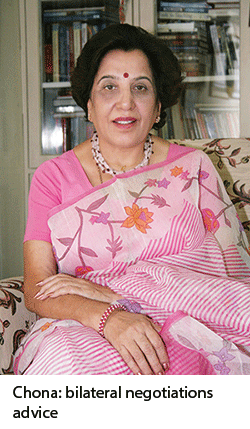 “My advice to the community of parents with children in private schools is not to invite government intervention in the administration of private schools. Parents should bear in mind that the RTE Act (i.e, Right of Children to Free and Compulsory Education Act, 2009) permits a reasonable increase in tuition fees every year. Moreover, they should also bear in mind that under the RTE Act private schools are obliged to admit poor children from their neighbourhood into primary classes free-of-charge with state governments paying a pittance for their education.
“My advice to the community of parents with children in private schools is not to invite government intervention in the administration of private schools. Parents should bear in mind that the RTE Act (i.e, Right of Children to Free and Compulsory Education Act, 2009) permits a reasonable increase in tuition fees every year. Moreover, they should also bear in mind that under the RTE Act private schools are obliged to admit poor children from their neighbourhood into primary classes free-of-charge with state governments paying a pittance for their education.
Therefore parents — especially those who want globally-benchmarked holistic education for their children — should note that private school managements are under tremendous pressure to balance their books. In the circumstances, my advice to them is to discuss and negotiate reasonable increases in tuition fees bilaterally with their school managements. Inviting government interference and diluting the autonomy of private schools is a bad idea,” says Dr. Shayama Chona, the celebrity former principal of the highly-ranked Delhi Public School, R.K. Puram (Delhi) and currently promoter-director of the Tamana School for special needs children in the national capital.
However, such sage advice tends to fall on stony ground. Despite a mountain of evidence — and most damningly the deplorable condition of government schools countrywide — a swelling coalition of lefties ideologically opposed to private schools, parents associations, professional agitators and mainstream media are ranged against private school managements and have painted them as capitalist exploiters of the hapless middle class. Curiously, they don’t discern the danger of government which has dismally failed to manage the country’s 1.5 million public schools, interfering with the administration of private independent schools in which as parents, they have a vested interest.
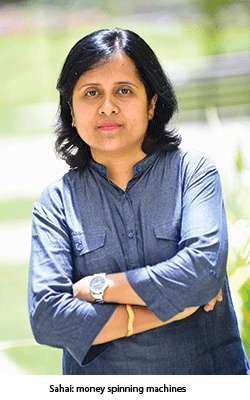 “Education institutions are supposed to be run as non-profit organisations by charitable trusts and commercialisation of education must be stopped. When private school managements ignore legislation such as the Tamil Nadu Recognised Private Schools (Regulation) Act, 1973 which requires tuition fees to be approved by a competent authority appointed by the government, the state government has to interfere and regulate tuition fees,” says Chennai-based S. Arumainathan, president of the Tamil Nadu Students and Parents Welfare Association. Sidestepping the question of why the association doesn’t recommend free-of-charge government schools to its members, Arumainathan suggests that simultaneously with raising teaching-learning standards in state government schools to the level of the 1,099 Kendriya Vidyalyas promoted by the Central government, the Tamil Nadu government “should stop giving permission to start private schools which are mainly profit-oriented”.
“Education institutions are supposed to be run as non-profit organisations by charitable trusts and commercialisation of education must be stopped. When private school managements ignore legislation such as the Tamil Nadu Recognised Private Schools (Regulation) Act, 1973 which requires tuition fees to be approved by a competent authority appointed by the government, the state government has to interfere and regulate tuition fees,” says Chennai-based S. Arumainathan, president of the Tamil Nadu Students and Parents Welfare Association. Sidestepping the question of why the association doesn’t recommend free-of-charge government schools to its members, Arumainathan suggests that simultaneously with raising teaching-learning standards in state government schools to the level of the 1,099 Kendriya Vidyalyas promoted by the Central government, the Tamil Nadu government “should stop giving permission to start private schools which are mainly profit-oriented”.
This sentiment of middle class entitlement, contempt for the fundamental rights of private school promoters, and naïve faith in the capability of notoriously corrupt government officials to fairly calibrate tuition fees chargeable by private schools, is pervasive in parents associations — often promoted by individuals of dubious antecedents and few, if any, qualifications other than an irrational sense of injustice. “It is absolutely necessary for government to regulate the tuition fees levied by private schools to curb commercialisation of education. Schools are necessarily charitable institutions and should not earn profits. Instead, these temples of learning have become money-spinning machines. Most of them are being run by builders, businessmen, property dealers and politicians who generate black money,” says Anubha Sahai, president of the Mumbai-based India Wide Parents Association (estb.2016) which claims “lakhs of members” as it is a federation of parents’ associations countrywide.
Curiously, despite the Supreme Court judgement in the T.M.A. Pai Foundation Case (2002) which ruled that all citizens have a fundamental right to engage in the “vocation” of education and earn a reasonable profit therefrom, the belief that private education — but not say, health and nutrition — providers should be forced to 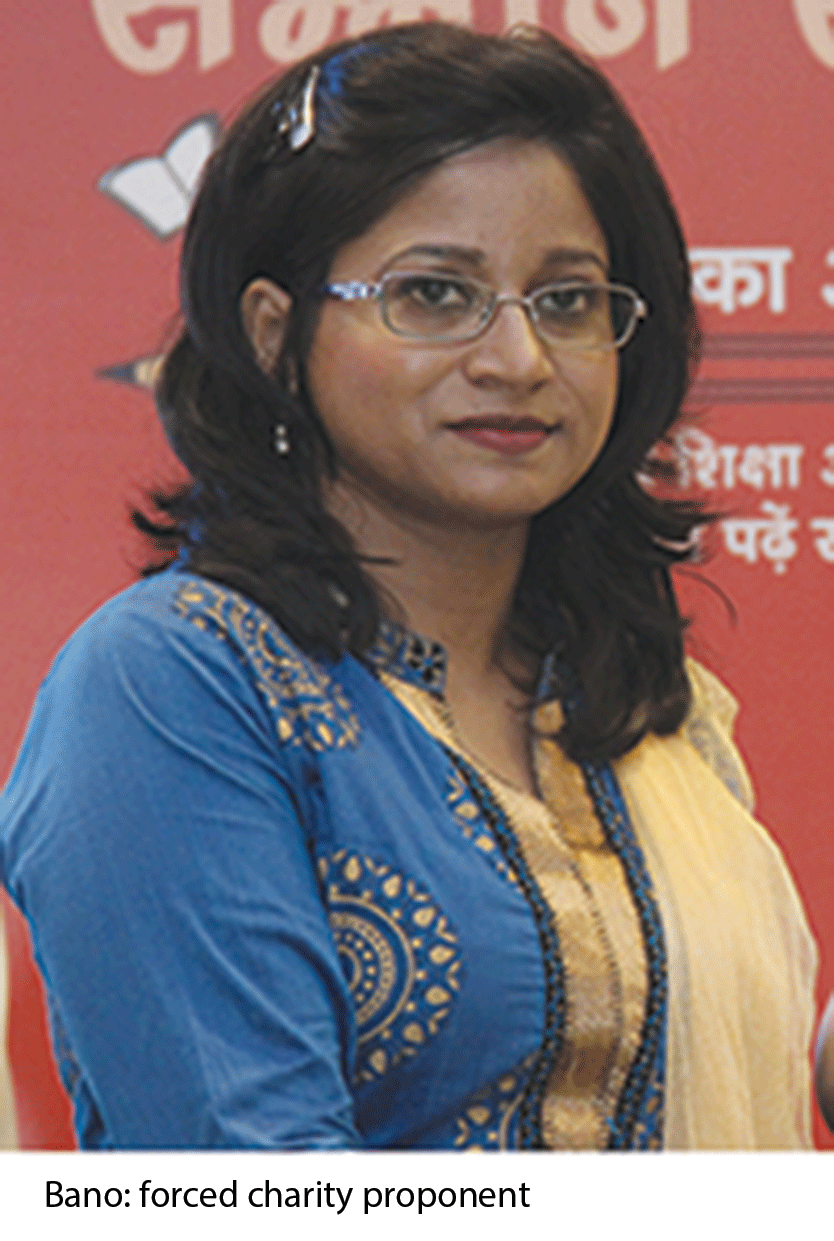 practice philanthropy, is embedded deep within the middle class mindset. “According to a report of Assocham — a private industry association — private school tuition fees have increased at a faster pace than middle class incomes, by 150 percent over ten years. The Assocham report admits that the average cost to parents per child in private schools has risen from Rs.55,000 to Rs.1.25 lakh per year in the past two years. This is why regulation of private schools is necessary — not to dilute their autonomy but to ensure that their promoters/managements are not permitted to make profits out of education institutions which under law are obliged to be run as non-profit, charitable organisations,” says Samina Bano, the Lucknow-based founder director of Rightwalk (formerly Bharat Abhyudaya Foundation), an NGO working with Unicef India and the Central Square Foundation to formulate a statutory body “to stop marketisation or commodification of education”.
practice philanthropy, is embedded deep within the middle class mindset. “According to a report of Assocham — a private industry association — private school tuition fees have increased at a faster pace than middle class incomes, by 150 percent over ten years. The Assocham report admits that the average cost to parents per child in private schools has risen from Rs.55,000 to Rs.1.25 lakh per year in the past two years. This is why regulation of private schools is necessary — not to dilute their autonomy but to ensure that their promoters/managements are not permitted to make profits out of education institutions which under law are obliged to be run as non-profit, charitable organisations,” says Samina Bano, the Lucknow-based founder director of Rightwalk (formerly Bharat Abhyudaya Foundation), an NGO working with Unicef India and the Central Square Foundation to formulate a statutory body “to stop marketisation or commodification of education”.
With sundry NGOs, parents associations and civil rights activists cheered on by the neta-babu brotherhood ever ready to enact legislation with wide discretionary powers, comfortably tenured academics and populist mainstream media protesting allegedly high tuition fees being levied by the country’s 320,000 ‘recognised’ or duly registered private schools — notwithstanding the reality that private school tuition fees in India are arguably lower than in any other country, including Pakistan and Bangladesh (see box) — individuals with dubious antecedents and motives have discovered an opportunity to harass and shake down successful, high-profile school promoters.
|
Average annual international school fees (US$)
Thailand 10,656
South Africa 3,828
United Arab Emirates 12,108
Hong Kong 14,712
Indonesia 13,740
Malaysia 5,904
Philippines 9,396
Kenya 10,500
China 33,396
Singapore 19,644
India 6,600*
Source: International School Database, Prague (2017)
* EW estimate NB $=64
|
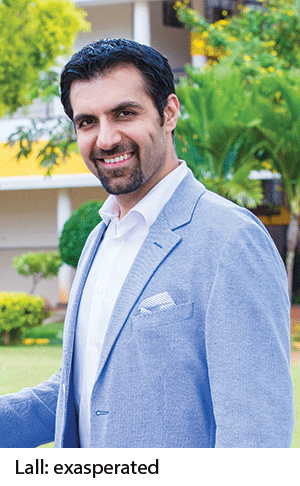 On April 1, Jesus Lall, chairman of the Mumbai-based Universal Education Group of 52 schools and higher education institutes across the country, filed a complaint with the Dahisar (Mumbai) police station against the city’s Forum for Fairness in Education (FFE). Lall submitted an email message allegedly sent by the forum’s president Jayant Jain, directing him to transfer a sum of Rs.25 lakh to FFE’s bank account failing which the forum would “escalate” the protest of parents against a tuition fee hike into a major confrontation against all four Universal High schools in Mumbai which have raised their tuition fees by 8-12 percent for the academic year 2017-18. However according to Jain, the forum’s email account had been hacked by the Universal Group to frame him.
On April 1, Jesus Lall, chairman of the Mumbai-based Universal Education Group of 52 schools and higher education institutes across the country, filed a complaint with the Dahisar (Mumbai) police station against the city’s Forum for Fairness in Education (FFE). Lall submitted an email message allegedly sent by the forum’s president Jayant Jain, directing him to transfer a sum of Rs.25 lakh to FFE’s bank account failing which the forum would “escalate” the protest of parents against a tuition fee hike into a major confrontation against all four Universal High schools in Mumbai which have raised their tuition fees by 8-12 percent for the academic year 2017-18. However according to Jain, the forum’s email account had been hacked by the Universal Group to frame him.
Even as his complaint against Jain is currently in “its final stages of police investigation”, Lall who has masterminded the meteoric growth of Universal Education from a solitary coaching institute into an education conglomerate which owns and manages 52 schools and higher education institutes with an aggregate enrolment of 35,000 students in 25 campuses countrywide, is despondent about the increasing persecution of private educators by government and parents associations.
“One of the cardinal principles of law and civil society — presumption of innocence — has been replaced by its opposite, presumption of guilt. Every tuition fees increase, however minor, even if justified and anticipated, is viewed with grave suspicion. Unfortunately, the most important stakeholders in the education system, i.e, parents, confuse irrational protests with knowledge and competence of school administration. I’m exasperated with these regressive developments. It’s time-consuming and expensive for educators to constantly have to fight legal battles to assert our fundamental right to establish and administer education institutions of our choice. The proper place of educators is in classrooms, not courtrooms,” says Lall.
The continuous swirl of confusion about the boundaries of autonomy of privately-promoted — usually at great official and under-the-table expense (see box p.54) — K-12 schools, has disheartened and disillusioned a large number of educationists who have invested their savings and mobilised land, labour and capital to promote new-age schools designed to develop the full potential of at least some, if not all, of the country’s talented children.
The government’s role should be limited to encouraging education of all types and at all price points. 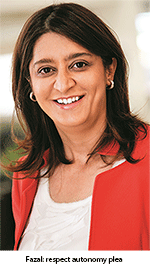 Government interference with the fee structures of private schools frustrates promoters and managements from realising the vision and goals which prompted them to establish schools of their choice. In Inventure Academy we don’t raise tuition fees by more than 10 percent annually and we take parents into full confidence in matters relating to administration of the school. None of our parents is dissatisfied with this arrangement. Therefore, there’s no cause for government or any external authority to determine our tuition fees. My advice to government is to respect the administrative autonomy of private schools and not be swayed by the motivated agitations of small minorities of disgruntled parents,” says Nooraine Fazal, an alumna of Bangalore and Boston universities who acquired valuable business and organisation management experience in a ten-year corporate career with IBM and Reuters in London, Dubai, Sydney, and Hong Kong before returning to India and co-promoting the CISCE, Delhi and CIE (UK)-affiliated Inventure Academy (IA), Bangalore in 2005. Billed as the country’s premier multiple intelligences development school, IA is ranked among the country’s Top 15 co-ed day schools by EducationWorld.
Government interference with the fee structures of private schools frustrates promoters and managements from realising the vision and goals which prompted them to establish schools of their choice. In Inventure Academy we don’t raise tuition fees by more than 10 percent annually and we take parents into full confidence in matters relating to administration of the school. None of our parents is dissatisfied with this arrangement. Therefore, there’s no cause for government or any external authority to determine our tuition fees. My advice to government is to respect the administrative autonomy of private schools and not be swayed by the motivated agitations of small minorities of disgruntled parents,” says Nooraine Fazal, an alumna of Bangalore and Boston universities who acquired valuable business and organisation management experience in a ten-year corporate career with IBM and Reuters in London, Dubai, Sydney, and Hong Kong before returning to India and co-promoting the CISCE, Delhi and CIE (UK)-affiliated Inventure Academy (IA), Bangalore in 2005. Billed as the country’s premier multiple intelligences development school, IA is ranked among the country’s Top 15 co-ed day schools by EducationWorld.
Yet if today India’s education system is mired in mediocrity and confusion and private schools which can hold a candle to the best primary-secondary day and boarding schools worldwide, are also in danger of slipping into mediocrity, their august lordships of the higher judiciary are also blameworthy.
|
Unease of doing private education
The main cause of rising fees of private schools is that there are too few of them. “Promoting and establishing new private greenfield schools — especially low and mid-priced schools — is a herculean task because of a plethora of government rules and regulations. With supply of private schools choked, the pressure for admission into existing mid-priced schools is tremendous. This enables them to raise tuition fees at will. Therefore, this is a good time to liberalise and deregulate Indian education on the lines of the industry liberalisation initiative of 1991 to keep tuition fees in check,” says Atul Thakkar, vice president (investment banking) and head of education practice at the Mumbai-based Anand Rathi Financial Services.
From the stage of land acquisition, obtaining permissions from civic planners, securing electricity and water supply connections, to obtaining the all-important NOC (no objection certificate), private school promoters have to get between 14-32 clearances and permissions (without time limits) from government officials/departments. Among them:
Registration as a society/trust. Profiting from education is prohibited by several Supreme Court judgements stretching back several decades. Therefore private edupreuners, whether a collection of like-minded people or a corporate entity promoting a school, must first register under the Societies Recognition Act, 1860 or Public Trust Acts of the states or set up as a not-for-profit company as prescribed by s. 8 of the Companies Act, 2013.
Land acquisition. If the society/trust wishes to buy land from the government, it will be required to obtain an Essentiality Certificate (EC) from the state government’s department of education to ascertain whether a private school is required by the public in the proposed area of location.
To establish a legally permissible ‘recognised’ private primary/secondary school, the following documents are usually required by state governments.
1. Registration certificate of society/trust
2. Essentiality certificate
3. Certificate of recognition
4. Certificate of upgradation
5. Certificate of affiliation (CBSE, CISCE, state or international exam board)
6. Affidavit swearing legal purchase of land and adherence to civic Master plan
7. Site and building plans
8. Building fitness certificate
9. Health certificate
10. Water testing report
11. List of first batch of students
12. Construction completion certificate
13. Duly constituted boards of trustees and management
14. Land use permission certificate (for rented land/buildings)
15. Fire compliance certificate
16. RTE Act compliance assurance
Local authority sanctions. Moreover, clearance certificates have to be obtained from municipal/fire/transport authorities regarding sanitary conditions, water/fire/transport safety. These certificates need to be renewed every five years.
CBSE/CISCE and international schools. All proposed CBSE/CISCE-affiliated schools must obtain NOC/Recognition letters from the state government in addition to the above listed permissions.
(Source: Anand Rathi Financial Services, Mumbai)
NB: This list is indicative. Approval procedures vary from state to state
|
“Post-independence India’s interventionist higher judiciary is to a great extent responsible for the confusion and litigious mess that we witness in Indian education. The admission of children into private independent colleges or schools falls within the ambit of the law of contract. The school prospectus which contains all terms and conditions including tuition fees, constitutes an offer to the general public. When parents apply for admission, they implicitly accept the terms and conditions contained in the prospectus. If there is any alleged breach of the terms and conditions, the remedy is an action for specific performance or damages under contract law. Instead of coming down hard on government for failing to universalise and improve public education, the judiciary has given education exalted status and imposed unwarranted constitutional obligations upon private educationists. This has discouraged the flow of investment into private — especially low and mid-priced — schools to which even the poorest households aspire, and has severely damaged Indian education,” says a senior counsel of the Bombay high court who prefers to remain anonymous.
Confronted by agitating parents, interventionist governments and unsympathetic courts, private school managements across the country are sinking into despondency. Although the common perception is that private schools are in clover raking in vast profits, it’s rare to find edupreneurs, educationists or philanthropists who have a good word to say about the ease of doing education in contemporary India.
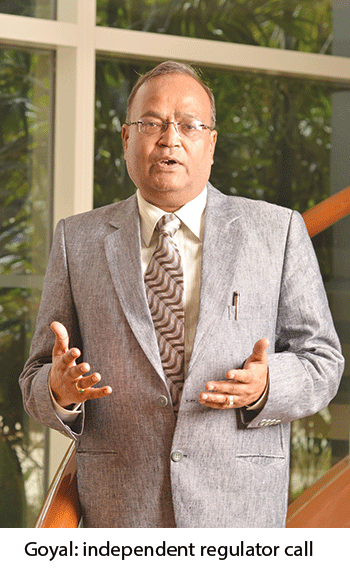 “Parents should appreciate that promoting and establishing high quality schools requires heavy investment which has to be recovered by promoters. The best option for parents concerned about rising private schools fees is to jointly negotiate fee increases with the management of their schools and simultaneously agitate for changes in the policies of their state governments to increase the supply of low and medium-priced private schools. Right now, state government laws relating to promotion of greenfield private schools are forbidding, and it’s impossible for all except very determined edupreneurs to start new schools. Thirdly, parents and citizens should demand higher teaching-learning standards in government schools so they have the option to send their children to free-of-charge public schools as is normative in developed countries. And lastly, the judiciary should revisit and review its rulings which decree private education as forced philanthropy. If private school fees must be regulated, an independent Education Regulatory Authority on the lines of the TRAI and Insurance Regulatory Authority of India could be established,” suggests Damodar Goyal, the Jaipur-based president of the Society for Unaided Schools of Rajasthan and well-known crusader for private education.
“Parents should appreciate that promoting and establishing high quality schools requires heavy investment which has to be recovered by promoters. The best option for parents concerned about rising private schools fees is to jointly negotiate fee increases with the management of their schools and simultaneously agitate for changes in the policies of their state governments to increase the supply of low and medium-priced private schools. Right now, state government laws relating to promotion of greenfield private schools are forbidding, and it’s impossible for all except very determined edupreneurs to start new schools. Thirdly, parents and citizens should demand higher teaching-learning standards in government schools so they have the option to send their children to free-of-charge public schools as is normative in developed countries. And lastly, the judiciary should revisit and review its rulings which decree private education as forced philanthropy. If private school fees must be regulated, an independent Education Regulatory Authority on the lines of the TRAI and Insurance Regulatory Authority of India could be established,” suggests Damodar Goyal, the Jaipur-based president of the Society for Unaided Schools of Rajasthan and well-known crusader for private education.
Quite obviously, K-12 education, of which private independent schools — favoured by even poorest households at the bottom of the country’s iniquitous socio-economic pyramid — are the saving grace, is at a multiple roads junction. Under intensifying pressure from the Central and state governments, misguided parents associations, populist mainstream media and the courts, their managements could take the line of least resistance and travel down the broad and easy road traversed by post-independence India’s public universities ruined by the interventionist neta-babu brotherhood, whose knowledge and knowhow of education management is in inverse proportion to its zeal to control and command.
Alternatively, private school promoters and managements can choose the rocky road and insist upon exercising their fundamental right to establish education institutions of their choice and run them according to their own lights. The history of education in post-independence India suggests that the national interest would be best served if private school managements take the hard road. And the enlightened among them who do take that path deserve the full support and assistance of parents who want their children to receive K-12 education which will provide them a strong foundation for higher education, and the increasingly complex challenges of the 21st century.
With Dipta Joshi (Mumbai), Puja Awasthi (Lucknow) & Hemalatha Raghupathi (Chennai)